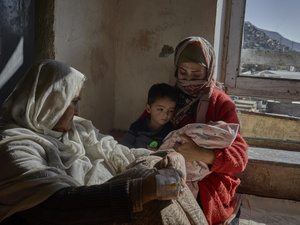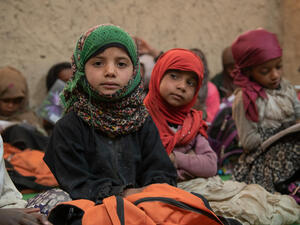Donors concerned about humanitarian needs in Georgia
Donors concerned about humanitarian needs in Georgia

Members of the donors mission during their visit to Georgia.
TBILISI, Georgia, April 7 (UNHCR) - Representatives of several key donor nations have expressed concern about the "overwhelming" humanitarian needs of tens of thousands of displaced people in Georgia.
The representatives from Estonia, France, Italy, Japan, Poland, Romania, Switzerland and the United States last Friday wrapped up a five-day trip to Georgia organized by the UN refugee agency.
They met some of the estimated 200,000 internally displaced people (IDPs) and refugees in the Caucasus country during visits to the Pankisi Valley and the breakaway Abkhazia region to the west. They also held strategy talks in Tbilisi with government officials, UNHCR staff and other key stakeholders.
One of the donor representatives told UNHCR that the mission members had found that "the humanitarian needs in this forgotten and protracted situation are overwhelming." The group also believed that "much has been done with very limited funds."
Johanna Langenkamp, head of UNHCR's Donor Relations and Resource Mobilization Service, said more humanitarian and development funding was needed to help meet the pressing needs of the displaced, including Chechen refugees who have been in the Pankisi Valley for almost a decade.
"Much more needs to be done to address the needs of the people," said Langenkamp, who accompanied the mission.
UNHCR has been involved in Georgia since the early 1990s, when it was tasked with taking a lead in assisting people displaced by the conflict in Georgia and its two breakaway regions - Abkhazia and South Ossetia.
Over the years, UNHCR has had multi-sectoral programmes to assist the IDPs as well as people who have spontaneously returned to their homes in Gali district.
In Georgia, UNHCR is - unusually - an integral part of the peace processes for both South Ossetia and Abkhazia. Along with other UN agencies, it also helps the Chechen refugees in the Pankisi.
The donor representatives met with Georgians who have been displaced since 1992, many of whom continue to live in makeshift collective centres such as factories, former rest houses and swimming pool complexes.
They visited Gali, where much of the infrastructure is in poor condition, including schools and medical centres, and is a situation not conducive to return in safety and dignity.
During the donor visit, UNHCR also hosted a planning workshop with stakeholders in Zugdidi, western Georgia to assess overall needs and prioritize activities. Housing, economics, education, health and legal issues were identified as key areas for intervention.
By Snezana Sazdic in Tbilisi, Georgia









